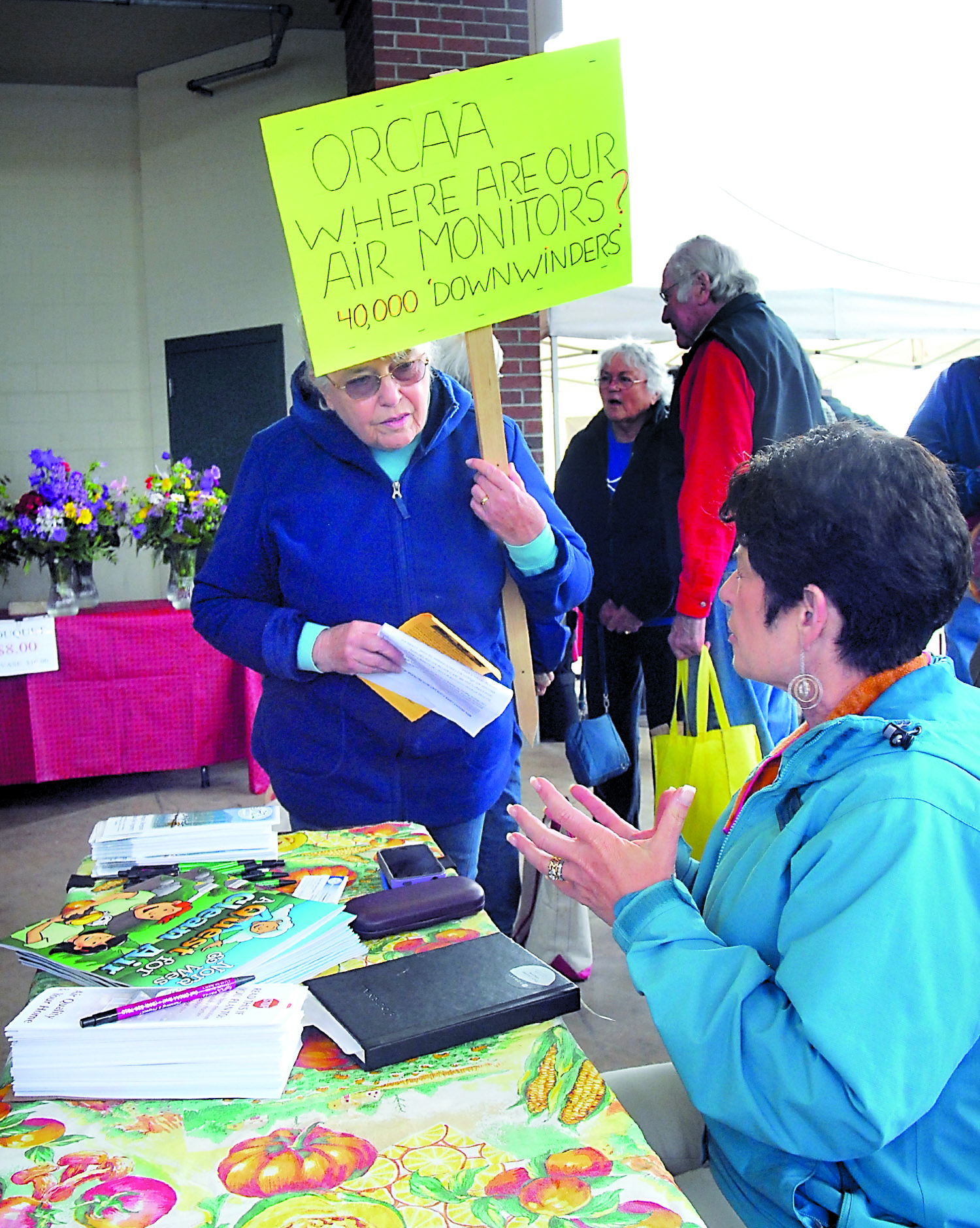PORT ANGELES — The executive director of the state agency responsible for regulation and enforcement of Clallam and Jefferson County’s air quality made a special appearance last weekend at the Port Angeles Farmers Market, and primarily fielded questions about a $71 million biomass co-generation expansion at the Nippon Paper Industries USA Inc. plant in Port Angeles.
“Even though we don’t have regulations for small particles, it doesn’t mean we are not going to pick them up,” Francea McNair said on Saturday, citing new federal clean-air regulations expected August 2013 that will assist the agency she heads, the Olympic Region Clean Air Agency — or ORCAA — in monitoring so-called “ultrafine” or “nanoparticulates” that are about 1/30th the width of a human hair.
McNair shared information at a table with Mayor Cherie Kidd and Port Angeles City Councilman Dan Di Guilio, who also sits on the ORCAA board.
Di Guilio invited her to the farmers market in The Gateway transit center at First and Lincoln streets as part of the city’s outreach efforts.
The tiny nanoparticulates are of special concern for members of environmental groups that have fought the biomass co-generation expansion in Port Angeles as well as at the Port Townsend Paper Corp., mill, a $55 million expansion.
Both projects are expected to be completed in 2013.
Opponents say that nanoparticulates are among the particles released by biomass facilities, which turn wood waste into heat and electricity.
And they say that such particulates can lodge in people’s lungs and cause severe damage, but are not separately regulated by the Environmental Protection Agency.
“The ultrafine particulates get deeply into your lungs. They get into your bloodstream,” Bob Lynette of Sequim, co-chairman of the Sierra Club’s North Olympic Group, said at a table he commanded on the other side of the farmers market on Saturday.
That makes them more deadly, said the retired Lynette, who worked for General Electric and Boeing before he formed one of the country’s leading renewable energy consulting firms, which he led for 15 years.
Proponents say biomass facilities like the one under construction at the Nippon mill generate less pollution than conventional plants and that nanoparticulates come from a variety of sources, including wood stoves.
Paul F. Perlwitz, Nippon environmental manager, who dropped by to visit with McNair, said the project would bring in a new, more efficient boiler than the old boiler dating back to the 1950s.
The new boiler at the future co-generation plant will help reduce particulate matter by 70 percent, McNair said.
“We think it’s a real improvement.”
Among those carrying signs and handing out leaflets against the Nippon project was Virginia Vadset of Sequim, who carried a sign that read, “ORCAA where are our air monitors? 40,000 downwinders.”
Vadset said she was approached by a person she did not know who asked her not to walk with her sign through the market.
She said she put down her sign and continued to hand out leaflets inside the market.
Cynthia Warne, market manager, said she didn’t know who had talked with Vadset, but said it was not her understanding that protests could be conducted at the market “because we pay rent to rent this facility so we have this market under our control.”
Meanwhile, members of Clallam Healthy Air Coalition such as Rose Marshall quietly walked around the market with signs and information leaflets protesting the Nippon biomass project.
They urged market-goers to sign a petition calling for the City Council to declare a health emergency and place a moratorium on the biomass project.
ORCAA did not issue the permit for the Port Townsend biomass expansion.
The construction permit for that facility was issued by the state Department of Ecology.
Regulation of the Port Angeles and Port Townsend mills fall under difference regulatory agencies because they use a “different type of processing,” McNair said, although she was uncertain about the details.
Port Townsend Paper manufactures craft paper used in cardboard boxes while the Port Angeles Nippon mill produces paper for phone books and newsprint for newspapers.
Kidd, who recently thanked Nippon for the biomass project and the company’s other contributions, said the protesters should be welcomed.
“We’re here to listen to them,” Kidd said, adding that the coalition members made it known they were coming because McNair was invited to the market.
McNair, whose agency regulates more than 700 businesses in the ORCAA Olympic Region, said, “Everybody is responsible for air quality. We all have a role in good air quality.”
She said 13 of those businesses fall under federal law, including Nippon, which is reviewed for air-quality permit renewal ever five years.
If it changes anything, such as equipment at the mill, it must apply to go through a review process.
________
Sequim-Dungeness Valley Editor Jeff Chew can be reached at 360-681-2390, extension 5052 or at jeff.chew@peninsuladailynews.com.

